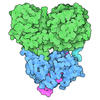[English] 日本語
 Yorodumi
Yorodumi- PDB-5yxn: A T cell receptor in complex with HLA-A0201 restricted Hepatitis ... -
+ Open data
Open data
- Basic information
Basic information
| Entry | Database: PDB / ID: 5yxn | ||||||||||||
|---|---|---|---|---|---|---|---|---|---|---|---|---|---|
| Title | A T cell receptor in complex with HLA-A0201 restricted Hepatitis C virus NS3 peptide (KLVALGINAV) | ||||||||||||
 Components Components |
| ||||||||||||
 Keywords Keywords | IMMUNE SYSTEM / TCR-peptide-HLA complex | ||||||||||||
| Function / homology |  Function and homology information Function and homology informationpositive regulation of hexokinase activity / symbiont-mediated perturbation of host cellular process / translocation of peptides or proteins into host cell cytoplasm / Toll-like receptor 2 binding / viral capsid assembly / adhesion receptor-mediated virion attachment to host cell / hepacivirin / TBC/RABGAPs / positive regulation of memory T cell activation / T cell mediated cytotoxicity directed against tumor cell target ...positive regulation of hexokinase activity / symbiont-mediated perturbation of host cellular process / translocation of peptides or proteins into host cell cytoplasm / Toll-like receptor 2 binding / viral capsid assembly / adhesion receptor-mediated virion attachment to host cell / hepacivirin / TBC/RABGAPs / positive regulation of memory T cell activation / T cell mediated cytotoxicity directed against tumor cell target / TAP complex binding / Golgi medial cisterna / positive regulation of CD8-positive, alpha-beta T cell activation / CD8-positive, alpha-beta T cell activation / positive regulation of CD8-positive, alpha-beta T cell proliferation / host cell mitochondrial membrane / host cell lipid droplet / symbiont-mediated transformation of host cell / symbiont-mediated suppression of host TRAF-mediated signal transduction / CD8 receptor binding / positive regulation of cytokinesis / antigen processing and presentation of exogenous peptide antigen via MHC class I / beta-2-microglobulin binding / symbiont-mediated perturbation of host cell cycle G1/S transition checkpoint / endoplasmic reticulum exit site / TAP binding / antigen processing and presentation of endogenous peptide antigen via MHC class I via ER pathway, TAP-dependent / protection from natural killer cell mediated cytotoxicity / antigen processing and presentation of endogenous peptide antigen via MHC class Ib / antigen processing and presentation of endogenous peptide antigen via MHC class I via ER pathway, TAP-independent / negative regulation of protein secretion / detection of bacterium / T cell receptor binding / symbiont-mediated suppression of host JAK-STAT cascade via inhibition of STAT1 activity / endoplasmic reticulum-Golgi intermediate compartment membrane / symbiont-mediated suppression of host cytoplasmic pattern recognition receptor signaling pathway via inhibition of MAVS activity / negative regulation of receptor binding / early endosome lumen / Nef mediated downregulation of MHC class I complex cell surface expression / DAP12 interactions / transferrin transport / cellular response to iron ion / Endosomal/Vacuolar pathway / Antigen Presentation: Folding, assembly and peptide loading of class I MHC / peptide antigen assembly with MHC class II protein complex / lumenal side of endoplasmic reticulum membrane / cellular response to iron(III) ion / negative regulation of forebrain neuron differentiation / MHC class II protein complex / antigen processing and presentation of exogenous protein antigen via MHC class Ib, TAP-dependent / ER to Golgi transport vesicle membrane / peptide antigen assembly with MHC class I protein complex / regulation of iron ion transport / regulation of erythrocyte differentiation / HFE-transferrin receptor complex / response to molecule of bacterial origin / MHC class I peptide loading complex / T cell mediated cytotoxicity / positive regulation of T cell cytokine production / antigen processing and presentation of endogenous peptide antigen via MHC class I / antigen processing and presentation of exogenous peptide antigen via MHC class II / positive regulation of immune response / MHC class I protein complex / peptide antigen binding / positive regulation of T cell activation / negative regulation of neurogenesis / positive regulation of receptor-mediated endocytosis / cellular response to nicotine / positive regulation of T cell mediated cytotoxicity / multicellular organismal-level iron ion homeostasis / SH3 domain binding / kinase binding / specific granule lumen / positive regulation of type II interferon production / phagocytic vesicle membrane / recycling endosome membrane / Interferon gamma signaling / Immunoregulatory interactions between a Lymphoid and a non-Lymphoid cell / negative regulation of epithelial cell proliferation / MHC class II protein complex binding / Interferon alpha/beta signaling / Modulation by Mtb of host immune system / late endosome membrane / sensory perception of smell / positive regulation of cellular senescence / tertiary granule lumen / antibacterial humoral response / DAP12 signaling / T cell differentiation in thymus / T cell receptor signaling pathway / negative regulation of neuron projection development / nucleoside-triphosphate phosphatase / E3 ubiquitin ligases ubiquitinate target proteins / channel activity / ER-Phagosome pathway / protein refolding / viral nucleocapsid / early endosome membrane / monoatomic ion transmembrane transport / protein homotetramerization Similarity search - Function | ||||||||||||
| Biological species |  Homo sapiens (human) Homo sapiens (human) Hepatitis C virus Hepatitis C virus | ||||||||||||
| Method |  X-RAY DIFFRACTION / X-RAY DIFFRACTION /  SYNCHROTRON / SYNCHROTRON /  MOLECULAR REPLACEMENT / Resolution: 2.03 Å MOLECULAR REPLACEMENT / Resolution: 2.03 Å | ||||||||||||
 Authors Authors | Hui, F. | ||||||||||||
| Funding support |  China, 3items China, 3items
| ||||||||||||
 Citation Citation |  Journal: To Be Published Journal: To Be PublishedTitle: Capturing HCV immune escape by targeting structural based mechanism Authors: Hui, F. | ||||||||||||
| History |
|
- Structure visualization
Structure visualization
| Structure viewer | Molecule:  Molmil Molmil Jmol/JSmol Jmol/JSmol |
|---|
- Downloads & links
Downloads & links
- Download
Download
| PDBx/mmCIF format |  5yxn.cif.gz 5yxn.cif.gz | 192.3 KB | Display |  PDBx/mmCIF format PDBx/mmCIF format |
|---|---|---|---|---|
| PDB format |  pdb5yxn.ent.gz pdb5yxn.ent.gz | 148.9 KB | Display |  PDB format PDB format |
| PDBx/mmJSON format |  5yxn.json.gz 5yxn.json.gz | Tree view |  PDBx/mmJSON format PDBx/mmJSON format | |
| Others |  Other downloads Other downloads |
-Validation report
| Arichive directory |  https://data.pdbj.org/pub/pdb/validation_reports/yx/5yxn https://data.pdbj.org/pub/pdb/validation_reports/yx/5yxn ftp://data.pdbj.org/pub/pdb/validation_reports/yx/5yxn ftp://data.pdbj.org/pub/pdb/validation_reports/yx/5yxn | HTTPS FTP |
|---|
-Related structure data
| Similar structure data |
|---|
- Links
Links
- Assembly
Assembly
| Deposited unit | 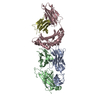
| ||||||||
|---|---|---|---|---|---|---|---|---|---|
| 1 |
| ||||||||
| Unit cell |
|
- Components
Components
-T cell receptor ... , 2 types, 2 molecules AB
| #1: Protein | Mass: 21741.057 Da / Num. of mol.: 1 Source method: isolated from a genetically manipulated source Source: (gene. exp.)  Homo sapiens (human) / Production host: Homo sapiens (human) / Production host:  |
|---|---|
| #2: Protein | Mass: 27456.523 Da / Num. of mol.: 1 Source method: isolated from a genetically manipulated source Source: (gene. exp.)  Homo sapiens (human) / Production host: Homo sapiens (human) / Production host:  |
-Protein , 2 types, 2 molecules CD
| #3: Protein | Mass: 31854.203 Da / Num. of mol.: 1 Source method: isolated from a genetically manipulated source Source: (gene. exp.)  Homo sapiens (human) / Gene: HLA-A, HLAA / Production host: Homo sapiens (human) / Gene: HLA-A, HLAA / Production host:  |
|---|---|
| #4: Protein | Mass: 11819.173 Da / Num. of mol.: 1 Source method: isolated from a genetically manipulated source Source: (gene. exp.)  Homo sapiens (human) / Production host: Homo sapiens (human) / Production host:  |
-Protein/peptide / Non-polymers , 2 types, 586 molecules I

| #5: Protein/peptide | Mass: 998.240 Da / Num. of mol.: 1 Source method: isolated from a genetically manipulated source Source: (gene. exp.)  Hepatitis C virus / Production host: Hepatitis C virus / Production host:  |
|---|---|
| #6: Water | ChemComp-HOH / |
-Details
| Has protein modification | Y |
|---|
-Experimental details
-Experiment
| Experiment | Method:  X-RAY DIFFRACTION / Number of used crystals: 1 X-RAY DIFFRACTION / Number of used crystals: 1 |
|---|
- Sample preparation
Sample preparation
| Crystal | Density Matthews: 2.56 Å3/Da / Density % sol: 51.96 % |
|---|---|
| Crystal grow | Temperature: 291 K / Method: vapor diffusion, hanging drop / Details: 21% PEG 3350, 0.18 M Ammonium tartrate dibasic |
-Data collection
| Diffraction | Mean temperature: 100 K |
|---|---|
| Diffraction source | Source:  SYNCHROTRON / Site: SYNCHROTRON / Site:  SSRF SSRF  / Beamline: BL17U1 / Wavelength: 0.9779 Å / Beamline: BL17U1 / Wavelength: 0.9779 Å |
| Detector | Type: ADSC QUANTUM 270 / Detector: CCD / Date: Apr 15, 2016 |
| Radiation | Protocol: SINGLE WAVELENGTH / Monochromatic (M) / Laue (L): M / Scattering type: x-ray |
| Radiation wavelength | Wavelength: 0.9779 Å / Relative weight: 1 |
| Reflection | Resolution: 2.03→50 Å / Num. obs: 61621 / % possible obs: 99.4 % / Redundancy: 4.25 % / Net I/σ(I): 8.4 |
| Reflection shell | Resolution: 2.03→2.08 Å |
- Processing
Processing
| Software |
| ||||||||||||||||||||||||||||||||||||||||||||||||||||||||||||
|---|---|---|---|---|---|---|---|---|---|---|---|---|---|---|---|---|---|---|---|---|---|---|---|---|---|---|---|---|---|---|---|---|---|---|---|---|---|---|---|---|---|---|---|---|---|---|---|---|---|---|---|---|---|---|---|---|---|---|---|---|---|
| Refinement | Method to determine structure:  MOLECULAR REPLACEMENT / Resolution: 2.03→20 Å / Cor.coef. Fo:Fc: 0.94 / Cor.coef. Fo:Fc free: 0.923 / SU B: 4.098 / SU ML: 0.114 / Cross valid method: THROUGHOUT / σ(F): 0 / ESU R: 0.196 / ESU R Free: 0.161 MOLECULAR REPLACEMENT / Resolution: 2.03→20 Å / Cor.coef. Fo:Fc: 0.94 / Cor.coef. Fo:Fc free: 0.923 / SU B: 4.098 / SU ML: 0.114 / Cross valid method: THROUGHOUT / σ(F): 0 / ESU R: 0.196 / ESU R Free: 0.161 Details: HYDROGENS HAVE BEEN ADDED IN THE RIDING POSITIONS U VALUES : REFINED INDIVIDUALLY
| ||||||||||||||||||||||||||||||||||||||||||||||||||||||||||||
| Solvent computation | Ion probe radii: 0.8 Å / Shrinkage radii: 0.8 Å / VDW probe radii: 1.2 Å | ||||||||||||||||||||||||||||||||||||||||||||||||||||||||||||
| Displacement parameters | Biso max: 94.22 Å2 / Biso mean: 26.045 Å2 / Biso min: 8.15 Å2
| ||||||||||||||||||||||||||||||||||||||||||||||||||||||||||||
| Refinement step | Cycle: final / Resolution: 2.03→20 Å
| ||||||||||||||||||||||||||||||||||||||||||||||||||||||||||||
| Refine LS restraints |
| ||||||||||||||||||||||||||||||||||||||||||||||||||||||||||||
| LS refinement shell | Resolution: 2.028→2.08 Å / Rfactor Rfree error: 0 / Total num. of bins used: 20
|
 Movie
Movie Controller
Controller


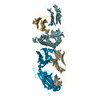
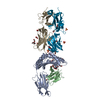
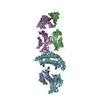

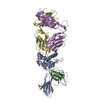
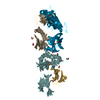
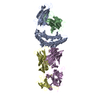
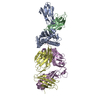
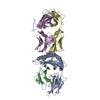
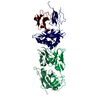
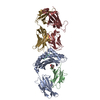
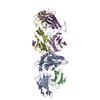
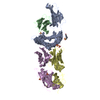
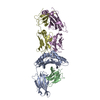
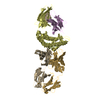


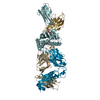
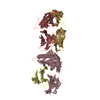
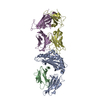
 PDBj
PDBj
